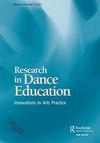促进职前教师发展的合作视频舞蹈学习类别
IF 0.9
3区 艺术学
0 DANCE
引用次数: 0
摘要
这项研究表明,视频舞蹈有可能为职前教师的课程分析和混合活动的实施带来范式转变。本文章由计算机程序翻译,如有差异,请以英文原文为准。
Cooperative videodance learning categories for pre-service teachers’ development
This study demonstrates that videodance has the potential to create a paradigm shift in curriculum analysis and the implementation of hybrid activities in pre-service teachers at both the individua...
求助全文
通过发布文献求助,成功后即可免费获取论文全文。
去求助
来源期刊

Research in Dance Education
DANCE-
CiteScore
2.50
自引率
30.00%
发文量
35
期刊介绍:
Research in Dance Education aims to inform, stimulate lively and critical debate and promote the development of high quality research and practice in dance education. The journal is relevant to dance academics, teachers and learners. The journal includes contributors from a wide and diverse, international community of researchers. This extends to all aspects of dance in education, providing opportunities for both experienced and less experienced researchers. The journal encourages a wide range of research approaches and methods, in a forum for debate. Issues related to pedagogy, philosophy, sociology and methodology in relation to creating, performing and viewing dance in various contexts are welcome. The role and value of dance as part of arts education and the connections with other arts practitioners is also supported. The research field of Research in Dance Education includes for example: all phases of education, pre-school to higher education and beyond; teaching and learning in dance, theory and practice; embodiment; new technologies; systematic reviews of literature; professional dance artists in education; learning in and through dance; aesthetic and artistic education; dance and the arts; dance and physical education; training dance teachers: initial teacher education, continuing professional development, dance degrees, and professional dance training; examination dance; dance therapy; special educational needs; community dance and youth dance; dance in society: gender, ethnicity, class, religion, economics; psychological issues: self esteem, motivation, body image; creativity; philosophy and the arts; research methods and methodologies.
 求助内容:
求助内容: 应助结果提醒方式:
应助结果提醒方式:


